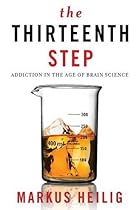The Thirteenth Step: Addiction in the Age of Brain Science

| Author | : | |
| Rating | : | 4.35 (569 Votes) |
| Asin | : | 0231172362 |
| Format Type | : | paperback |
| Number of Pages | : | 320 Pages |
| Publish Date | : | 2014-07-24 |
| Language | : | English |
DESCRIPTION:
He is a fellow of the American College of Neuropsychopharmacology and is an editor of leading scientific journals in the field.. Markus Heilig is a physician scientist and one of the most highly cited addiction researchers of his generation. For the past decade, he has led one of the largest research programs on addictive disorders in the world at the National Institute on Alcohol Abuse and Alcoholism at the National Institutes of Hea
"Incredibly insightful and helpful" according to mary Wuestefeld. This book is filled with scientific research and information that is helpful in understsnding the true nature of addiction and the most helpful approaches to successful treatment. There are also many compelling stories included that make it a very interesting read.. Jay Schulkin said Well written and researched. This is a very good book. It is written well, self-reflective and personable. It is historically informed and, most importantly, it is written by a clinician active in research in the field of addiction. It is scientifically informed and delivered in a very understandable form. It is easy to read and interesting; worthwhile.Jay Schulkin, Ph.D., Department of Neuroscience, Georgetown University. An Excellent Read Carlton Haggard As a treatment professional, I found this book to be an excellent read about the science of addiction and evidenced-based treatments available. Heilig's chapters on molecular culprits and pills for addiction are superb. The entire book does an excellent job of reviewing the history of treatments for addiction, as well as the history of evidenced-based medical treatments for alcohol use disorders. He handles a discussion of AA with aplomb, and with the pragmatic view of a scientist. Overall, an excellent read for anyone interested in the science of addiction, the pharmaceutical t
Expensive new programs for managing addiction are also flourishing, but since they are not based in science, they offer little benefit to people who cannot afford to lose money or faith in their recovery.Clarifying the cutting-edge science of addiction for both practitioners and general readers, The Thirteenth Step pairs stories of real patients with explanations of key concepts relating to their illness. The past thirty years have witnessed a revolution in the science of addiction, yet we still rely on outdated methods of treatment. Merging science and human experience, The Thirteenth Step offers compassionate, valuable answers to anyone who hopes for a better handle on a confounding disease.. One person's effort to find a burrito shack in a foreign city illuminates the reward prediction error signaled by the brain chemical dopamine. With these examples and more, this volume paints a vivid, readable portrait of drug seeking, escalation, and other aspects of addiction and suggests science-based treatments that promise to improve troubling relapse rates. A police chief wh
I applaud his efforts to bring the plight of the addicted to the attention of others and for his calling upon the field to do its very best to help. His book brings to life the countless devastating effects of addiction that affect individuals across all strata of society while attacking the stigma of addiction and shows the importance of neuroscience in understanding and treating it. (Choice)Markus Heilig has succeeded in making the airy dismissals of biological evidence-based approaches to addiction, such as those he heard in medical school, no longer tenable. (Library Journal)What makes this book especially compelling is the author's ability to smoothly transition between dealing with addictions at the human clinical level and at the more abstract level of scientific research
